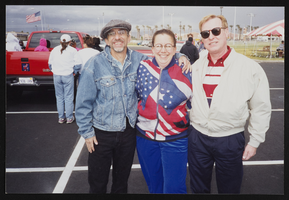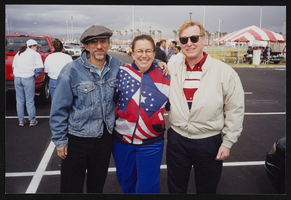Search the Special Collections and Archives Portal
Search Results
Denise Miller oral history interview
Identifier
Abstract
Oral history interview with Denise Miller conducted by Deborah Whicker on March 02, 1981 for the Ralph Roske Oral History Project on Early Las Vegas. Miller discusses the dance community in Las Vegas, Nevada. Miller also talks about the significance that the arts had in Las Vegas and how it changed throughout the years.
Archival Collection
Billie Milton oral history interview
Identifier
Abstract
Oral history interview with Billie Milton conducted by John Losky on May 05, 1976 for the Ralph Roske Oral History Project on Early Las Vegas. In this interview, Milton discusses moving to Las Vegas, Nevada from New York state in 1948. Milton discusses her family life and her career as a housekeeper. She also discusses hotels and casinos in Las Vegas.
Archival Collection
Dan Lubin oral history interview
Identifier
Abstract
Oral history interview with Dan Lubin conducted by David Schwartz on November 30, 2016 for the History of Gaming Oral History Project. In this interview, Lubin, the author of The Essentials of Casino Game Design: From the Cocktail Napkin to the Casino Floor discusses the process of creating successful casino games, the process involved in the game design, and technical and business considerations.
Archival Collection
Ann Lynch oral history interview
Identifier
Abstract
Oral history interview with Ann Lynch conducted by Sandra Klimik on October 17, 1985 for the UNLV University Libraries Oral History Collection. In this interview, Lynch briefly explains how she started working in hospitals as a volunteer in 1959 and then gives an overview of the development of hospitals in Las Vegas, Nevada. Most of the interview is directed at the development and history of Sunrise Hospital and Medical Center in Las Vegas. Lynch discusses the developers, Irwin Molasky, Moe Dalitz, Allard Roen and Merv Adelson, and their the original goal to build a physician medical building to attract doctors to their planned community, which included the Las Vegas Country Club and gold course, the Boulevard Mall, and the Boulevard Apartments. She describes the opening of the hospital in 1958, and then moves into a more detailed discussion of nurses and how their roles have shifted since the 1960s. Finally, she talks about the city's growth and the economic burden insurance companies and federal programs like Medicare and Medicaid have on hospital profitability.
Archival Collection
Gary Delvin oral history interview
Identifier
Abstract
Oral history interview with Gary Delvin conducted by Roberta Threatt on April 08, 2003 for the Public School Principalship Oral History Project. In this interview, Delvin reflects upon his nearly 30-year career as an elementary school teacher and administrator in Oregon from the 1970s to the early 2000s. He discusses his upbringing and path to becoming a teacher, his philosophy of education, and training that he feels was most helpful throughout his career.
Archival Collection

Peck, Brown, and Parks at the second annual Gay Pride parade, image 001: photographic print
Date
Archival Collection
Description
Gay Pride 1998 (Dennis McBride, photographer) 4-25-98. 2nd annual parade. (L-R: Gary Peck, American Civil Liberties Union; Lori Lipman Brown; Nevada State Assemblyman David Parks.)
Image

Peck, Brown, and Parks at the second annual Gay Pride parade, image 002: photographic print
Date
Archival Collection
Description
Gay Pride 1998 (Dennis McBride, photographer) 4-25-98. 2nd annual parade. (L-R: Gary Peck, American Civil Liberties Union; Lori Lipman Brown; Nevada State Assemblyman David Parks.)
Image
Isabelle Rice oral history interview
Identifier
Abstract
Oral history interview with Isabelle Rice conducted by Angela Tampol in November 2021 for the Reflections: The Las Vegas Asian American and Pacific Islander Oral History Project. In this interview, Rice discusses her childhood in moving around the United States as a child in a military family until settling down in Las Vegas, Nevada in 2018. She reflects on the concept of a "model minority" and shares her experiences with racism and stereotypes that surround that idea. Rice also reflects on her memories of Taiwan, her grandparents, and her family.
Archival Collection
Shirley Helmick oral history interview
Identifier
Abstract
Oral history interview with Shirley Helmick conducted by Lyle Helmick on May 12, 1978 for the Ralph Roske Oral History Project on Early Las Vegas. Helmick discusses her personal history, occupational history, and reasons for moving to Nevada. She also explains events that the United Methodist Church hosts.
Archival Collection
Mattie M. Wormwood oral history interview
Identifier
Abstract
Oral history interview with Mattie M. Wormwood conducted by Judy Williams on March 09, 1976 for the Ralph Roske Oral History Project on Early Las Vegas. Wormwood discusses growing up in Las Vegas, Nevada. She also shares the changes Las Vegas went through during times of segregation and discrimination.
Archival Collection
